Czech Hussite Deck
Czech “Hussite” Pack engraved by Karel Hoffmann and first printed by Jan Ritter in 1895.
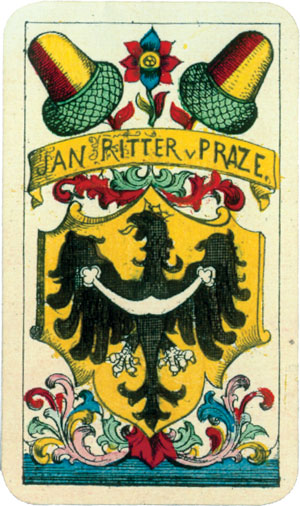
Czech “Hussite” Deck
During the 19th century Czech language, culture and National Identity were revived, as distinct from the dominant German culture of the Austro-hungarian Empire of which the Czech lands were a part. As a result, the Czech language has been restored as an official language in the Czech lands and is now used by the vast majority of Czechs. The name “Hussite” comes from the followers of Jan Hus (1373-1415), a church reformer and early creator of Czech as a literary language.
1st Edition, 1895
The “Hussite” Pack was engraved by Karel Hoffmann and first printed by Jan Ritter in 1895. Although German suit symbols are used, Czech historical persons are depicted on the court cards, including Jan Zizka (blinded in one eye and whose death is depicted on the Eight of Leaves), Ottokar II, Prokop the Bald, George ‘Jiri’ of Podebrad and Wenceslas (Vaclav) IV. The Daus (Two) of Acorns shows the arms of Silesia; Hearts shows the arms of Bohemia; Leaves the arms of Tabor. Other cards show wine making and local people.
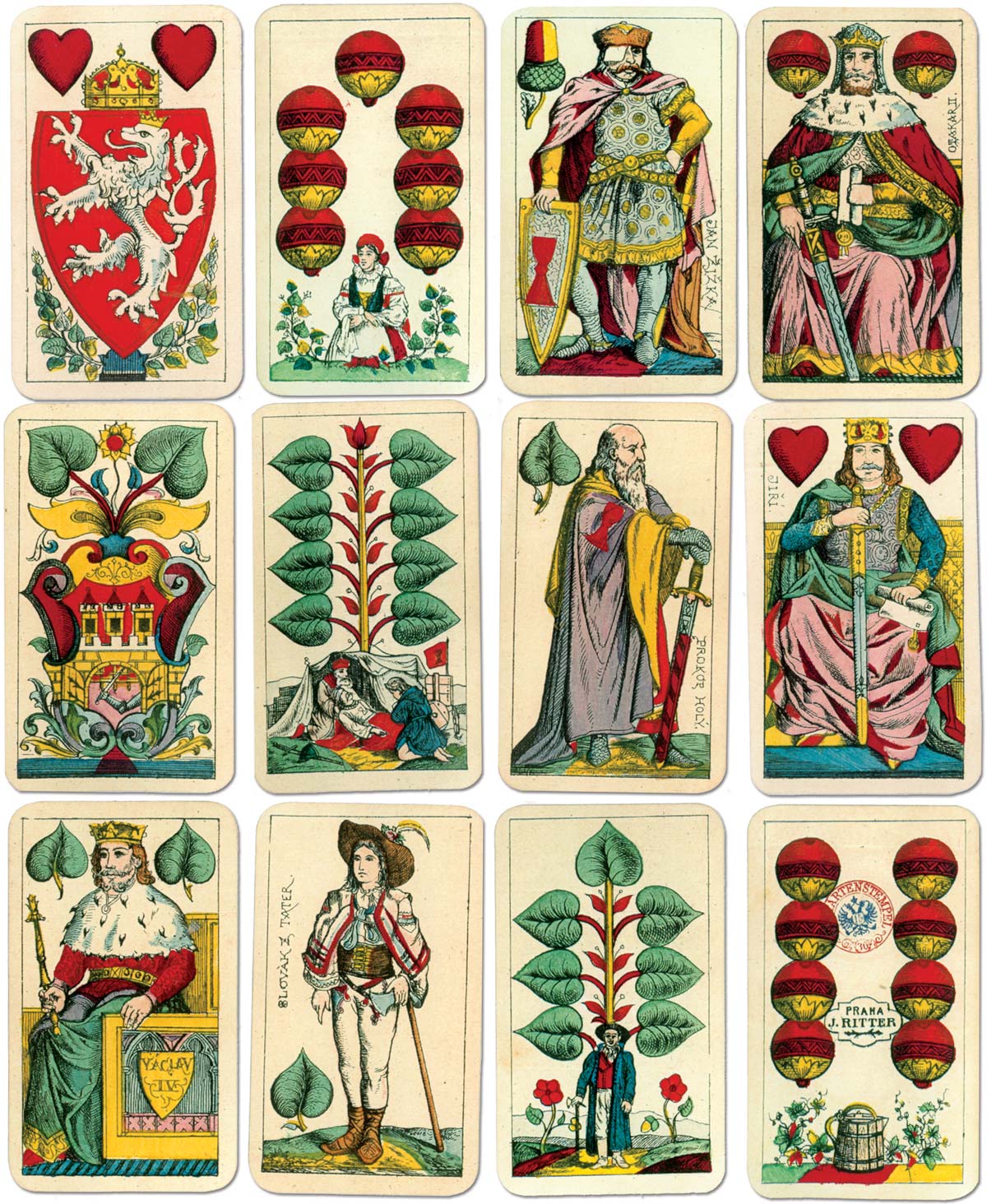
Above: Czech “Hussite” playing cards engraved by Karel Hoffmann and first printed by Jan Ritter in 1895. The tax stamp on the 8 of Bells was in use in Austria from 1900 to 1920 suggesting that this pack was a slightly later edition.
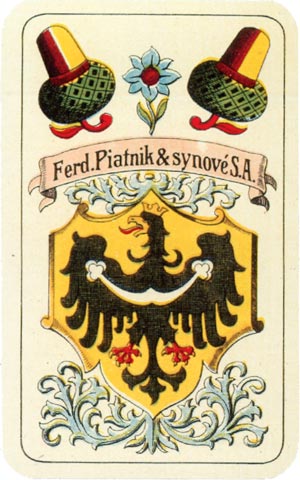
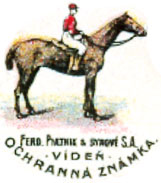
2nd Edition, 1927
In 1899 Ritter sold his playing card business to Piatnik. A condition of the deal was that card production would continue in Prague. In 1927 a new factory was built in Prague named Ferd. Piatnik & Synové S.A. and it was probably then that a second edition of the “Hussite” Pack was printed.
In the Piatnik edition the cards have been redrawn but generally follow the same designs of the earlier pack. The Daus (Two) of Leaves in this edition features the arms of Slovakia and the Daus of Bells the arms of Monrovia. The Seven of Hearts shows the Petrin Tower, a smaller version of the Eiffel Tower in Paris, which still stands today.
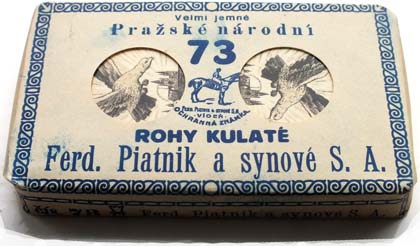 The Spodek of Acorns depicts a Silesian ('Slezan'). Jaroslav Sternberg (Svrsek of Hearts) was a mythical figure said to have defeated the invading Mongol hoardes at the Battle of Olmonouc.
The Spodek of Acorns depicts a Silesian ('Slezan'). Jaroslav Sternberg (Svrsek of Hearts) was a mythical figure said to have defeated the invading Mongol hoardes at the Battle of Olmonouc.
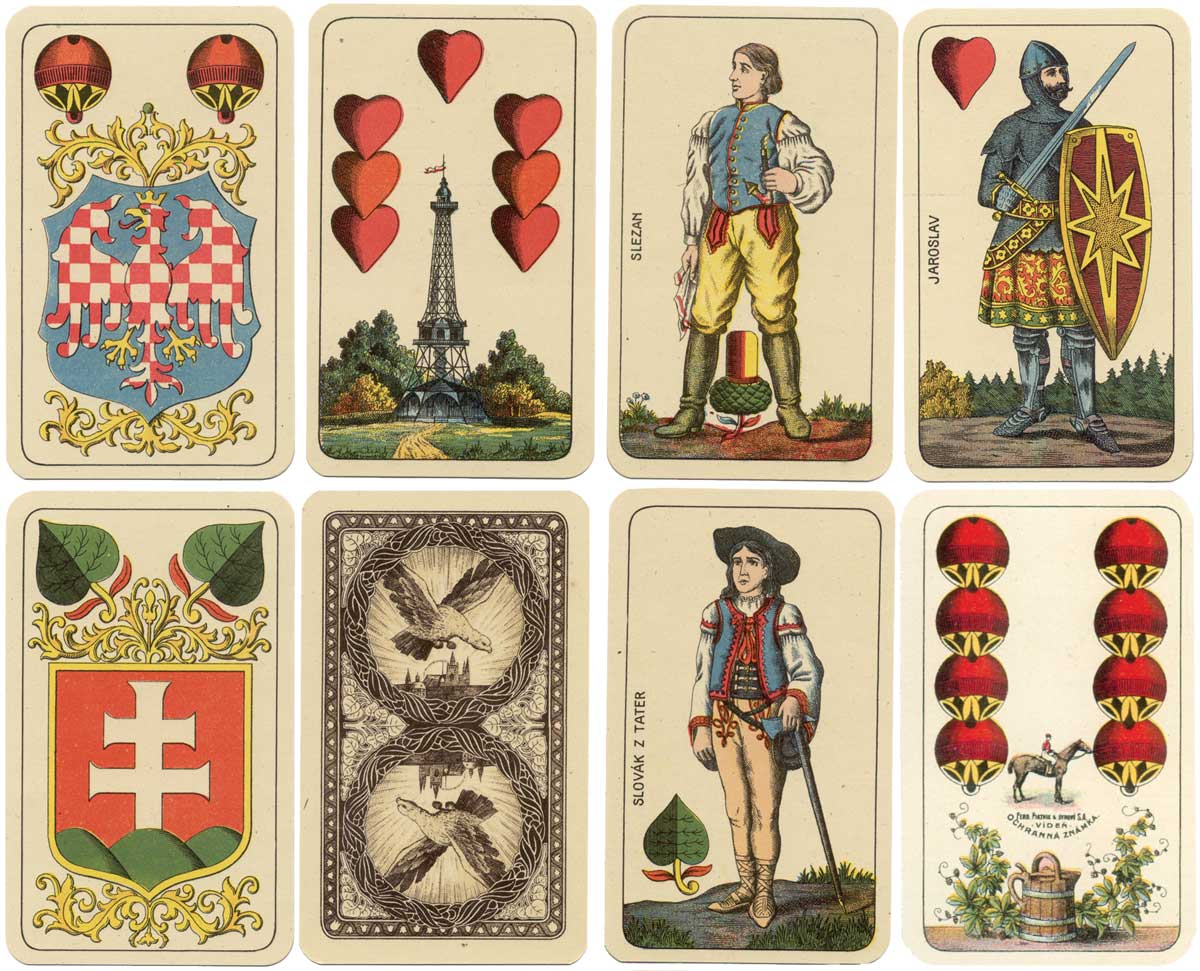
Above: second edition of the “Hussite” Pack, printed in Prague by Ferd. Piatnik & Synové S.A., c.1927.
REFERENCES
Šťáhlavsky, Zdenĕk: "A Czech Hussite Pack for the 1895 Ethnographical Exhibition in Prague", The Playing-Card vol.34 no.4, April-June 2006, IPCS, England.
• See also: Czech Nationalistic • 1908 Prague Jubilee Exhibition • 'Jugendstil' designed by Artuš Scheiner, 1920 • Ritter & Cie "Art Deco", 1933 • Eagle Playing Card Co., Ltd.

By Simon Wintle
Member since February 01, 1996
I am the founder of The World of Playing Cards (est. 1996), a website dedicated to the history, artistry and cultural significance of playing cards and tarot. Over the years I have researched various areas of the subject, acquired and traded collections and contributed as a committee member of the IPCS and graphics editor of The Playing-Card journal. Having lived in Chile, England, Wales, and now Spain, these experiences have shaped my work and passion for playing cards. Amongst my achievements is producing a limited-edition replica of a 17th-century English pack using woodblocks and stencils—a labour of love. Today, the World of Playing Cards is a global collaborative project, with my son Adam serving as the technical driving force behind its development. His innovative efforts have helped shape the site into the thriving hub it is today. You are warmly invited to become a contributor and share your enthusiasm.
Related Articles

Czech National Patterns by S.D. Modiano
Modiano produced cards with the Prague and Trappola patterns in the early 20th century.

Doppel-Deutsche Karten by Bratří Willnerové, Teplice
This deck from local manufacturer Bratří Willnerová offers a standard version of the popular Central...

Prager Pattern by Bratří Willnerové, Teplice
Traditional single-ended Prager pattern by Willner Brothers from northern Bohemia.

Ukraine playing cards
Historical figures from Ukraine’s past in a familiar Piatnik style.

Animal Skat, Česká Grafická Unie
A non-standard deck from Czechoslovakia.

Czech Bohemian style playing cards
Czech Bohemian style playing cards with a charming aesthetic, reflecting the cultural and social lif...

Play Architecture
Twentieth century architects and their creations on a well-designed pack from Finland.

Art pack I
Art pack featuring Old Masters, including Bruegel, Vermeer, Titian, Raphael, Caravaggio, Canaletto, ...

Austria Ski Team playing cards
Photos of members of the Austrian skiing team replace the normal courts on two different packs.

Grunwald 1410 – The Battle of Tannenberg
Details from the famous painting of the Battle of Grunwald (1410) by the Polish painter Jan Matejko....

Piatnik’s 200th Anniversary
A special philatelic souvenir for Piatnik’s 200th anniversary, combining playing cards an...

Art pack II, Austria
Renaissance portraits by Albrecht Dürer, Lucas Cranach, Hans Holbein, Barthel Beham, Christoph Amber...

Marmite
Fifty-Four images celebrating a UK savoury spread, that has been around one hundred and twenty two y...

Film Noir
A deck of 55 cards, celebrating hard boiled heroes, wise-cracking women, mean streets, guns and gums...

Science Fiction
A deck of 55 cards, celebrating a time when Science Fiction truly was, Science Fiction.

Feh Schnapskarten
Colourful promotional pack for Feh household and toilet papers.
Most Popular
Our top articles from the past 28 days

